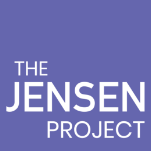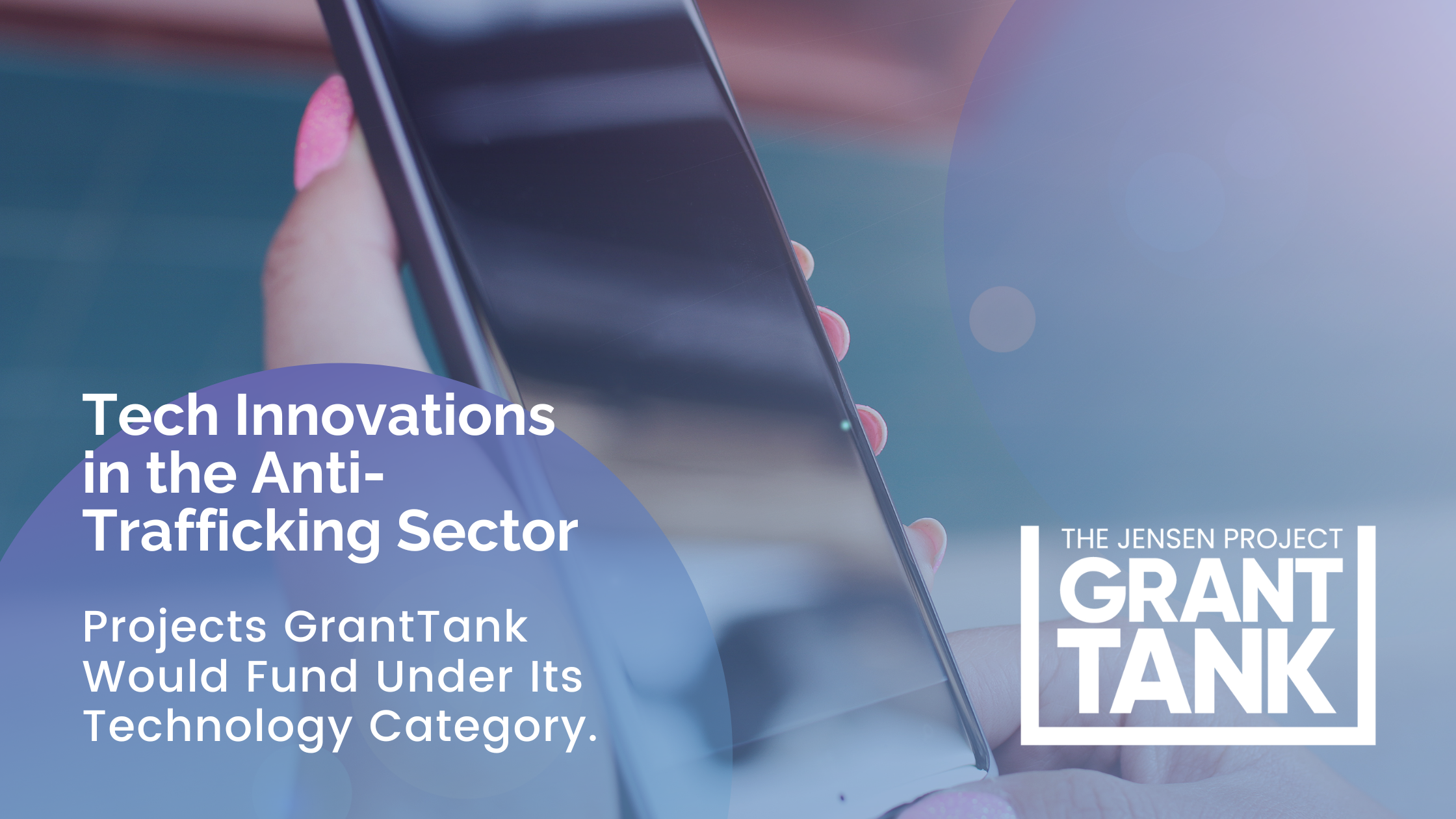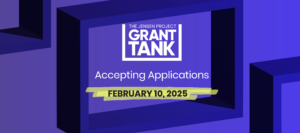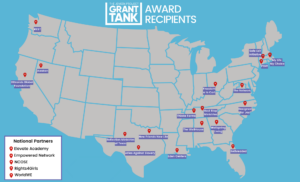Projects GrantTank Would Fund under Its 2024 Technology Category
The 2023 GrantTank application cycle was The Jensen Project’s first year to announce Technology as a funding category. Last year, we selected one NGO to fund under Technology for GrantTank: Allies Against Slavery, for the research they intended to conduct through and add to their Lighthouse software.
Allies Against Slavery stood out to us last year not only because of their mission, intention, and historical impact in the movement, but also because their application clearly fit the criteria and the funding category. We received some applications that requested funding for documentaries or to sponsor a third-party software. We do not categorize narrative media, necessarily, as a technology application (though you will see one exception in the list below), and we would categorize existing software, built by a for-profit organization, as a General Operations grant. We do fund General Operations, but you may be more successful if you require Gen Ops funding for Housing, Economic Empowerment, or Policy categories.
If you plan to apply for GrantTank funding under the Technology category, your application has a higher chance of being seriously reviewed if they show similarities to the projects below:
Deepfake Stopping Technology
Until recently, deepfake pornography could be categorized as superimposing a person’s face onto a pornographic video, making it appear as if the known person and the person in the explicit video are one and the same. This can be used to degrade a person or to gratify a fantasy for the deepfake creator, along with their followers.
Recently Taylor Swift was the victim of deepfake pornography, which brought the issue to light for the general public. However, this has been an issue for everyday women. The deepfake technology that is available to download often targets women specifically. The technology has become “smarter”—it is now able to crawl a user’s social media content and merge photos, creating an amalgamation of the images and then “removing” the user’s clothing to create an approximation of their naked body.
There are organizations that use facial recognition technology to confirm explicit photos were shared on forums consensually. Other organizations are “racing to create AI deepfake detectors.” These endeavors qualify for GrantTank funding under the Technology category.
Other opportunities could be to keeping deepfake technology from being promoted or operational.
AI Detecting Technology
As artificial intelligence continues to develop, it is becoming harder and harder to determine which images are “real” and which are not. Currently, a tell-tale sign that AI has created an image is by looking at the hands—there is something about the fingers that will look off, or sometimes images will even include entirely fabricated hands in strange places. However, AI is still learning how to mirror human behavior and appearance more accurately, and it is learning rapidly. A study recently found that people could not determine the difference between people created by AI and images of real people.
This, in conjunction with deepfake pornography, may lead to an increase in image-based sexual abuse, as well as pose a threat to image-based evidence. Even incriminating pictures and screenshots, used as evidence against traffickers, may be eventually dismissed on the grounds that they cannot be proven to be original images.
Projects focusing on identifying when AI was used to alter or create a false image are vital to protecting survivors and preventing future abuse. There are some organizations that have launched products that detect AI usage, but the technology has a long way to go, and funding can help get it there.
Leak-Proof Images
Jennifer Lawrence, Hayley Williams, Kate Upton—many celebrities were victimized by having their “nudes” leaked in 2014. Most recently, Drake has been the victim of a leak. While it’s worth noting that Drake has engaged in problematic behaviors, we believe that no one should fear or fall victim to having their naked body displayed without their consent.
Public perception of celebrity leaks has not changed much between 2014 and today: when online users learn about the leaks, they sometimes go out of their way to seek them out, to see what others are seeing and add commentary to the “trend.” Public entitlement to celebrities aside, having access to images from another person’s device should simply not be possible.
Research is being conducted about non-fungible tokens and digital art, and the same could be attributed to any image taken with a phone, not simply images containing explicit content. iPhones can now unsend messages—how much safer would the world be if we could unsend images, retracting them from others’ Photos? Netflix has a way to keep online users from screen recording their content, which means it’s possible to keep online users from taking screenshots of private content as well.
What advancements must be made in cyber security to ensure people’s personal devices are better protected from hackers?
Apps for Survivors
Recently, our GrantTank partner AnnieCannons soft-launched an app, ResourceFull, that will rapidly connect survivors with resources.
The National Human Trafficking Hotline is an important resource for survivors; however, the wait time can present as a barrier to exiting The Life. Likewise, the many other crisis lines can be confusing for survivors to organize—who has availability and who doesn’t, whose criteria do they meet, etc.—and survivors may find themselves discouraged or even retraumatized by having to repeat their trafficking story again and again. ResourceFull will soon enable survivors to list their information and needs in one place. Instantly, the app will populate resources that the user may qualify for.
We fund the Economic Empowerment program at AnnieCannons, but this is exactly the kind of project we hope to see in our GrantTank applications this cycle.
Gamified Education
Narrative helps consumers remember the message more clearly—that’s partly why fables and parables are so powerful. Likewise, gamifying a message has a lasting impact on participants. The anti-violence movement has delved into gaming as a vehicle for education before, but to not the extent that it could.
The domestic violence movement has “In Her Shoes,” an in-person simulation played on story cards that detail what it’s like to be a domestic violence or dating violence survivor.
Spent is an experiential website that simulates extreme poverty. Players make decisions about which imperative bills are more important to them—healthcare or groceries? Electricity or gas?
An example of gamification in the anti-trafficking movement is the Lifeboat ACT Game app, which teaches users to spot the signs of trafficking as they play the game as fictional avatars.
Yet, there is so much more to explore here. Though demographics overlap for survivors, no survivor looks exactly the same as the next, which creates an opportunity for varying stories and different types of avatars. The Jensen Project would love to see how gamification can transform the way advocates educate the general public about human trafficking.
Disclaimer
This is not a comprehensive list of what a technology-specific application might entail. We are open to some creative interpretation. Your program’s similarity to a listed project does not guarantee acceptance as a GrantTank recipient. The Jensen Project’s application cycle is rigorous and stringent, so that we can ensure our GrantTank partners are the best anti-trafficking organizations in the sector, important because we host regular gatherings that enable leaders and subject matter experts to share their expertise with one another in the hope that we can streamline the process of helping survivors.
Apply for GrantTank by March 15
If your organization needs funding for a technological innovation in the anti–sex trafficking sector, then apply to GrantTank if you also meet the following criteria:
- You are a 501(c)3 non-governmental organization that has been established for at least two years.
- You are willing to be transparent with goals, financials, needs, successes, and failures.
- You are seeking a two-way partnership with The Jensen Project. We are looking for an on-going relationship to help eradicate the landscape of sexual violence.
- You have a proven record of success.
- You have a core mission to contribute to the fight against sex trafficking.
- You are based in and serve adult female survivors of sex trafficking in the United States.
Please note: ALL criteria must be met to be eligible for funding consideration. If you do not meet all criteria currently, wait to apply at a time when you do.






